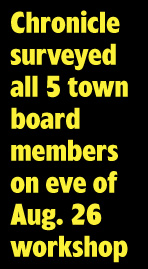By Zander Frost, Chronicle Staff Writer
Heading into the solar law workshop scheduled for Thursday, Aug. 26, at 6 p.m., The Chronicle spoke with all five members of the Moreau Town Board.
The board is debating how much of the town’s 8,400 acres of farmland should be open for commercial-level arrays of electricity-generating solar panels.
The law as currently proposed restricts array construction to 40% coverage of lots in Moreau’s agriculture district, and never on “prime soil.”
Some property owners say the town should allow solar installations on any farm lands they own, and in some cases have owned for generations.
Town Supervisor Todd Kusnierz seeks limits. Under his proposal, “we would not permit them on soils that are classified by the USDA as ‘prime soils,’ or soils of what they classify as ‘farmland of statewide importance’.
“And so out of that 8,400 acre figure, the acreage for prime soils is about 1,950. And the number of acres for farmland of statewide importance is 323. So approximately 25% of the most valuable farmland in the Ag District would be protected…”
Councilman John Donohue says, “Myself, I am pro-solar, I am also pro-property rights. I think there’s plenty of places in our town where solar fits. And there’s plenty of places in town it really doesn’t fit.”
He says, “The supervisor is big on — he says he wants to save agriculture in the town. But here’s the deal. He wants no Tier 3 [larger scale] solar arrays on any prime soil in the agricultural district. And he said there’s plenty of places to put it other than prime soil, which is not true…
“And he says he wants to save the agricultural district and the soils. And so do I. And the way to do this is keep these farmers farming [by allowing solar]…There’s not a lot of people lined up to start in the farming business. These are farms that have been in families for 30, 40, 50 years. And these people are struggling because their profit margins have shrunk. Some of them don’t even farm the land anymore.”
Supervisor Mr. Kusnierz says, “A majority of our production farmers…those individuals that grow feed for their own farm consumption…are adamantly opposed to any solar.”
He says, “Farmers, in order to expand their operations, need access to the most valuable land that they can get. And we have production farmers right here in this town, because they haven’t been able to secure enough farmland, that are buying farmland in neighboring communities…So there is a need for it….
“I’m very concerned that if the town board were to move forward with this proposal [to allow solar on the farmland designated prime and of statewide importance], that would essentially result in the eventual demise of the ag district…
“If you look at other communities across the U.S., solar farms are being located in…land that is of minimal value. That’s where the focus is in communities. And it’s not good government policy, I think, to change zoning that only benefits a few.”
“Some people say, well, that means you’re opposed to solar technology. Absolutely not. I’m opposed to commercial electric generating facilities in the ag district. We should be looking at placing them on land like an industrial park, where it has minimal impact or zero impact on the neighbors.”
“I personally, would love to have people show up,” Councilman John Hogan said of the workshop. “I’d like to move forward.”
“I think the communities themselves want to see solar, or they want to have solar — they don’t necessarily want to see it. That’s my feeling on it.”
Asked how he himself feels, Mr. Hogan said, “Just about like that.”
“It involves money and it involves people’s property. I personally don’t want to be too restrictive on other people’s property. I wouldn’t want it to be done to me.”
He suggests that even with solar panels installed, the land can be farmed. “‘I’ve read where they can…plant strawberries in underneath these,” he says. “There’s ways to continue to use the soil…”
Councilman Kyle Noonan says, “Historically, what happens when your farm lands are no longer farmed? Then they’re never going to be farmed again. This is the first step I feel in the end of farming in the town of Moreau. I really do.”
He says, “It seems that the most controversial part is how, you know, how can you as a town board tell a farmer what they can do? I mean, I agree with that. One of the statements I said from the very first meeting was I think farmers are the best stewards of their own land…
“So we do need to look at a way as a board to figure out how to get some of these tier three power plants in some of the areas currently where they’re not allowed,” but he also wants limits on what he terms “massive energy producing power plants…large, commercial” operations.
Mr. Noonan suggests a middle ground. Allow solar on a designated 40% of the farmland — but “let them seek permission from the Zoning Board to increase your allowed amount. Let the folks who’ve gone to training, one of the great things about a zoning board is they have to complete so many hours of training every year.”
“What the public wants us to do — and we have an obligation to the public — the public wants us to meet and amend this law and take out some of those words,” says Mr. Noonan. “The ‘prime farmland,’ and ‘soil of statewide importance’ are the words they want us to take out. But if we’re going to take those out, we’re going to add probably some other stuff in, like maybe an overlay district or whatever it might be. We still have to protect the agricultural lands in the town.”
Councilman Alan VanTassel said, “I think that coming out of the process, so far, I’m seeing a better opportunity than not that we can find the right balance in the agricultural district that will allow for some solar and still protect soils of significance, importance, and prime farmlands and the aesthetics of the community.”
Mr. VanTassel said, “I one-hundred per cent do not think that allowing some solar in the agricultural district is going to have any negative impact on the agriculture that’s happening. I actually think there’s an opportunity, if we do it right, to enhance some agriculture for some farmers that are struggling today.”
Would limiting where solar panels can be installed result in farmland being turned into housing developments?
Mr. Donohue said land owners in the ag district have “been approached from downstate contractors and developers, and they want to come up here and put all kinds of housing out in the agricultural district. Well, it certainly wouldn’t protect soils out there.
But Mr. Noonan counters, “These large land developers that want to build the single family homes know it’s not viable land…because of the zoning…right now, minimum of five acres for one house 250 feet of road frontage. That’s not a lot.”
Copyright © 2021 Lone Oak Publishing Co., Inc. All Rights Reserved
 Glens Falls Chronicle Serving the Glens Falls/Lake George region; Warren, Washington and northern Saratoga counties since 1980
Glens Falls Chronicle Serving the Glens Falls/Lake George region; Warren, Washington and northern Saratoga counties since 1980



